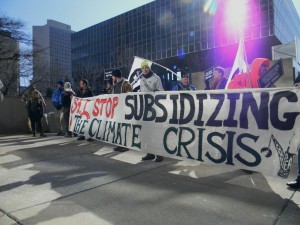Big Mountain Survival School 2013
Click here to download event flyer
St. Louis Ballot Initiative Against Peabody’s Tax Breaks
By Tim Logan. From STL Today
Local progressive activists this week will open a new front in their long-running battle with Peabody Energy: They’re going after tax breaks for the coal giant’s business partners.
Missourians Organizing for Reform and Empowerment plans Wednesday to file signatures for a ballot measure that would ban St. Louis tax incentives for any company that engages in “unsustainable” energy production or that does $1 million a year in business with any such company. They’re aiming for a public vote in the spring.
If the measure passes, it could upend the city’s menu of business subsidies — it covers everything from tax abatement to tax increment financing to city-backed bonds and loans — and critics say it could drive companies out of St. Louis altogether. But supporters say it’s a way to stop subsidizing law firms, banks and large-scale polluters and shift public money to more grass-roots efforts.
“The game is rigged, and we’re never going to win if we keep handing money to these companies,” said Jeff Ordower, MORE’s executive director.
The debate hinges on Peabody Energy, the global coal producer that is, in terms of revenue, the largest company headquartered in the city of St. Louis.
Peabody has been the focus of countless protests by local environmental and social justice groups in recent years. It also received city tax breaks in 2011 when it signed a new lease in the Gateway One Building on Market Street, keeping its 600 local employees downtown through 2026.
The measure to be submitted Wednesday would prohibit those sort of breaks in the future for “unsustainable energy producers” — extractors of coal, oil, natural gas and nuclear materials. It would also prohibit them for any company that does at least $1 million annually in business with those sort of companies, a clause that Ordower says could include utilities, some banks and law firms, perhaps advertising agencies or PR shops. For white-collar service providers, it would force a choice, he said: Work with Peabody, or receive tax breaks, but not both.
“Not only do you have to be doing business with a fossil fuel company, you also have to be getting public money,” Ordower said. “If you’ve got a private business doing private business-y things, this won’t affect you.”
But critics of the measure say it could have a much wider reach.
Jane Dueker, a St. Louis attorney who said she’s representing “people who oppose this,” points to a clause in the measure that would prohibit “any monetary or nonmonetary benefit related to any public fund or program” and warns that could be interpreted broadly enough to block basic city services from any company that spends $1 million a year in electricity.
“Think about how many large employers spend $1 million a year on electricity. This was so clearly not thought through,” she said. “How could anyone take this credibly? It’s a stunt.”
Dueker said her group plans a legal challenge to knock the measure off the ballot, should it get there. Ordower said MORE has collected 36,000 signatures, well above the roughly 22,000 needed to qualify. If the Board of Election certifies those the Board of Aldermen may then vote to approve the measure, but if they don’t it will go to a general election, likely in April or May.
The bill also includes measures to encourage subsidies for alternative energy and to market city-owned vacant land for energy uses. But most of the debate will likely focus on the incentives piece.
Ordower said he expects “the opposition will be large,” but said his group has been lining up support for months, organizing social justice, environmental and some labor groups. They’ve met with aldermen and the mayor’s office, too. It’s unclear where those politicians will come out; a spokeswoman for Mayor Francis Slay said Friday he’d have no comment until after the measure was filed.
Peabody, though, wasted little time before blasting MORE’s campaign.
“It takes a special anti-everything activist group to oppose the economic development, charitable giving and job creation of some of the city’s largest employers,” the company said in a statement. “We’re confident the people of St. Louis appreciate civic leadership and corporate responsibility, and Peabody Energy is pleased to have provided sustainable, affordable energy for St. Louis and the world for 130 years.”
Other companies that may be affected by the measure held their fire, for now. The Laclede Group, for instance, is considering sites for a headquarters expansion. It has said it wants to stay in the city. When asked if this sort of bill might change those plans, a Laclede spokeswoman said the gas utility would wait until the petitions were filed and study their potential impact before commenting.
Attorneys who work on location deals warned the bill could well drive companies out of the city, and that if it does it would hurt the entire region both economically and environmentally.
“The name of the game is jobs and economic development and we desperately need to bring that back into the central city,” said Bill Kuehling, a veteran development lawyer at Polsinelli in St. Louis. “Steps that have the potential to drive that away have other potential environmental issues attached to them, like sprawl.”
But Ordower said the city needs a more sustainable approach, both to energy and to incentives and the jobs they’re designed to create. This is an effort to make that happen.
“The economy is not working for most residents of this city,” he said. “We need to try something different.”




